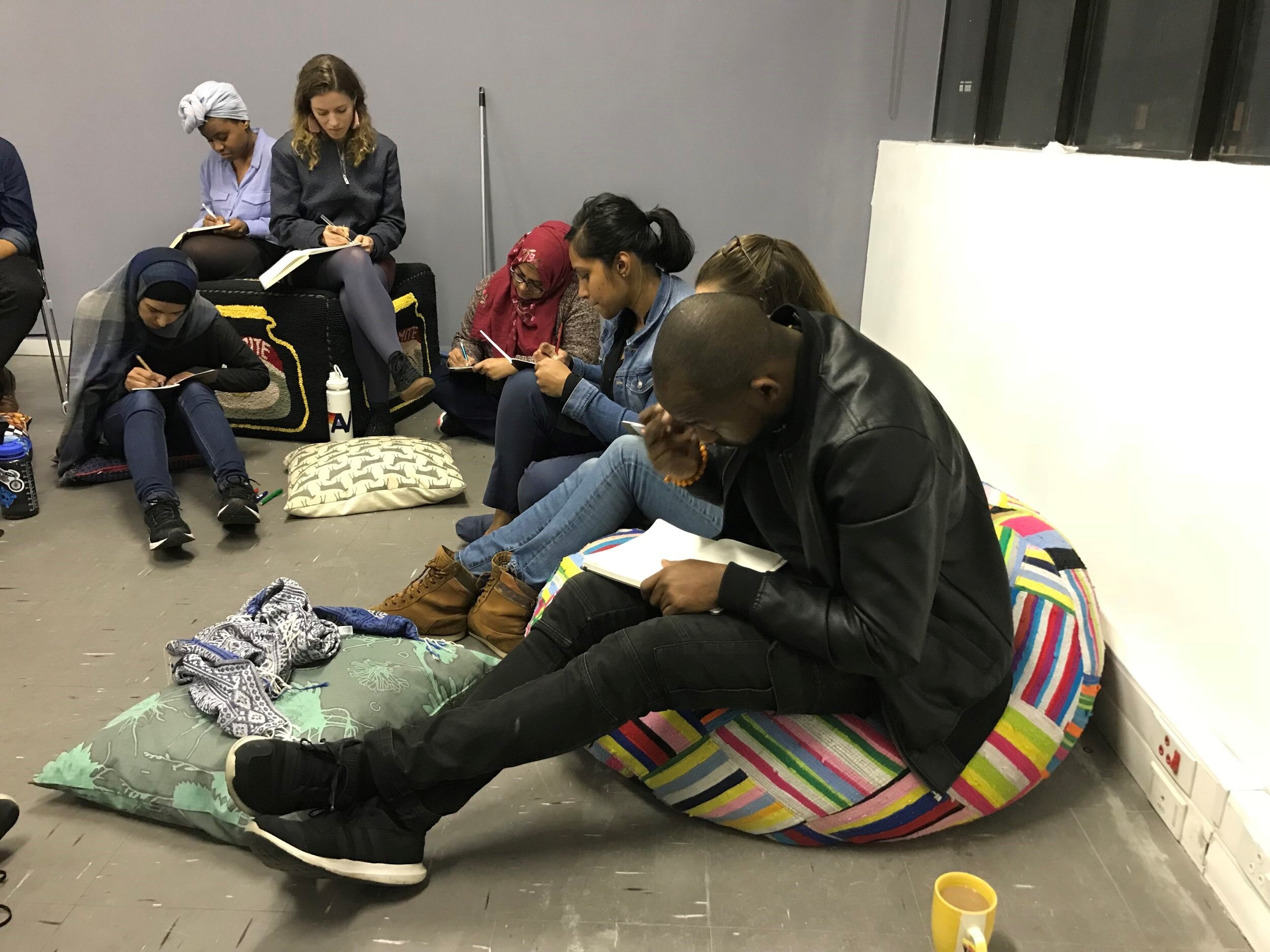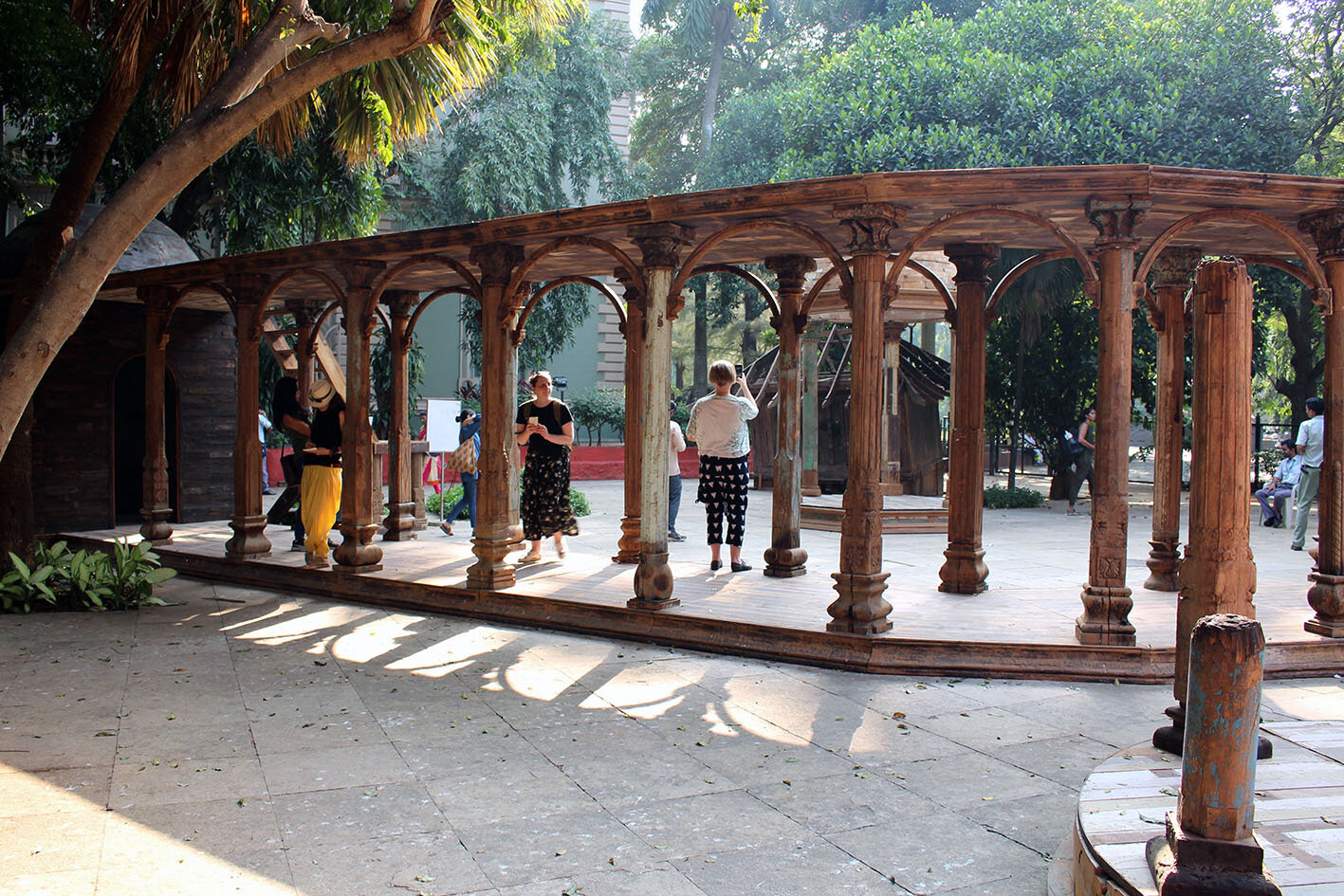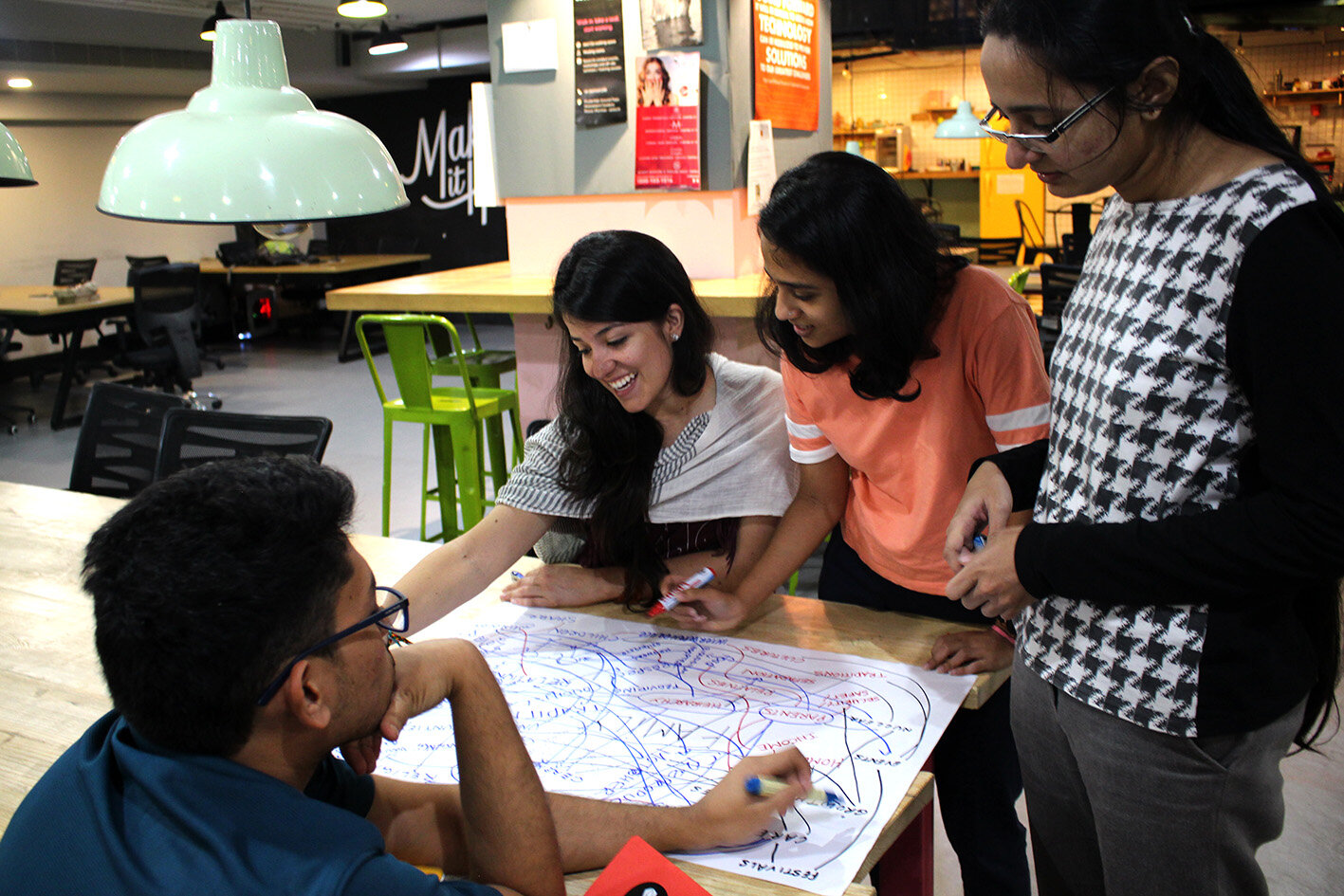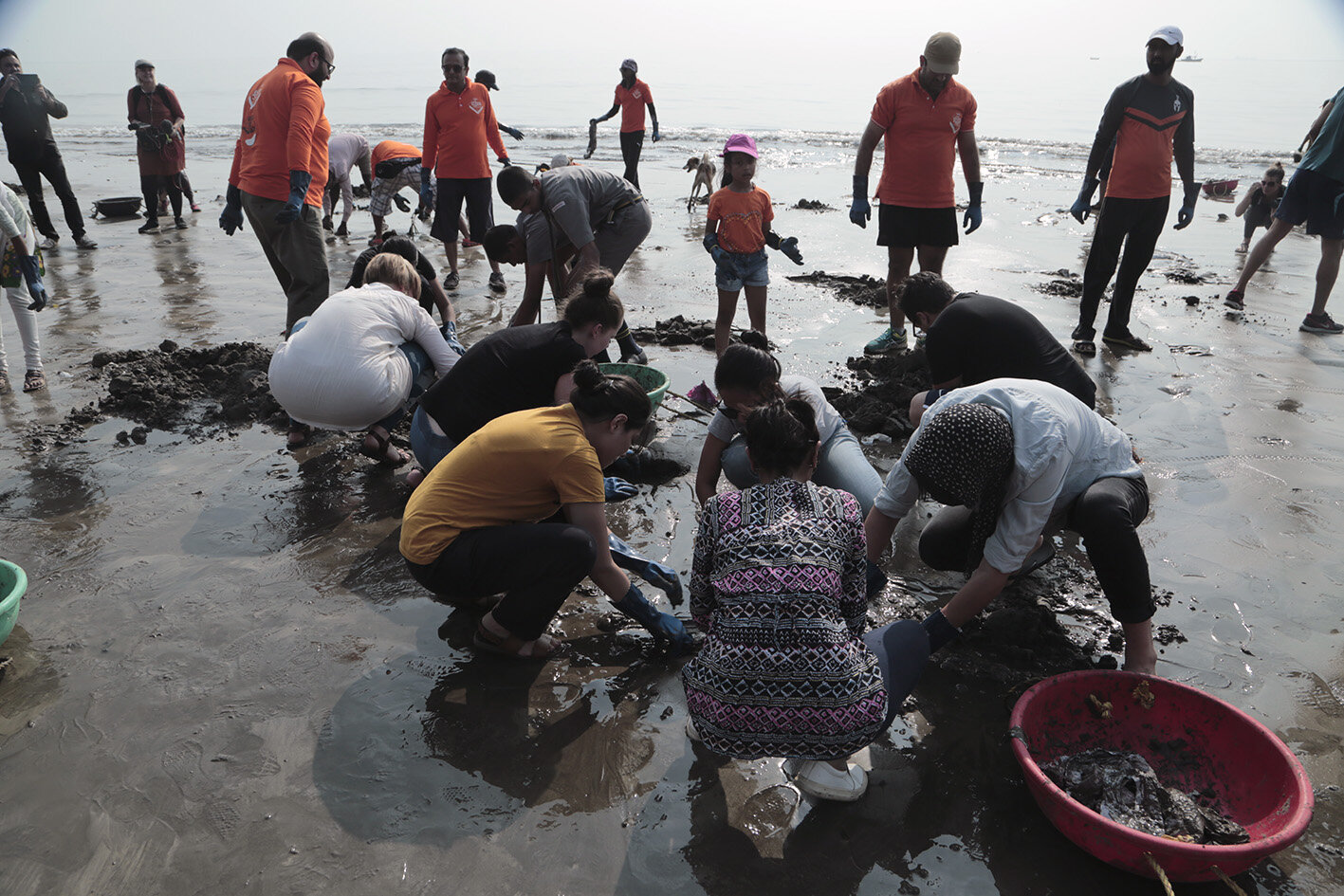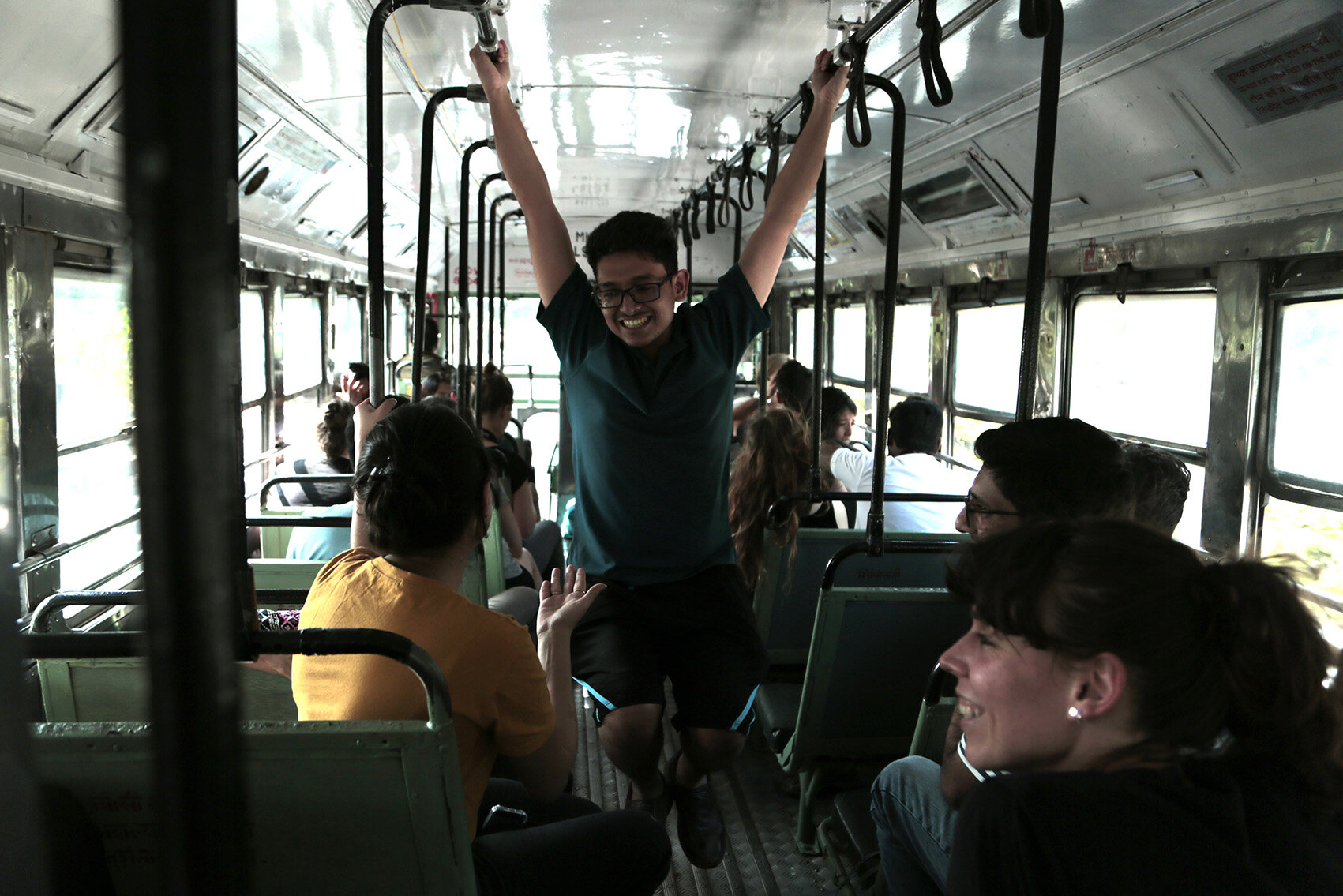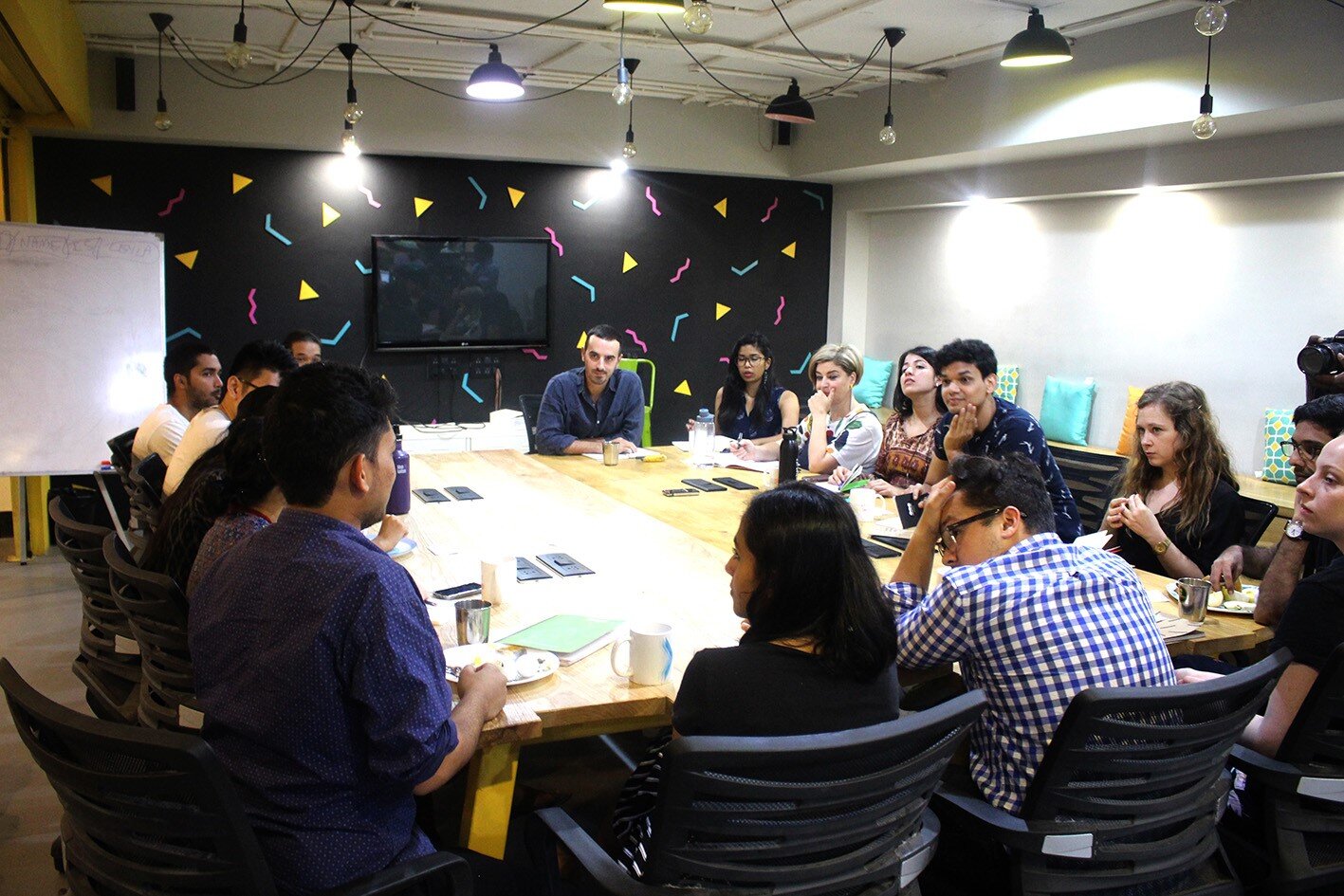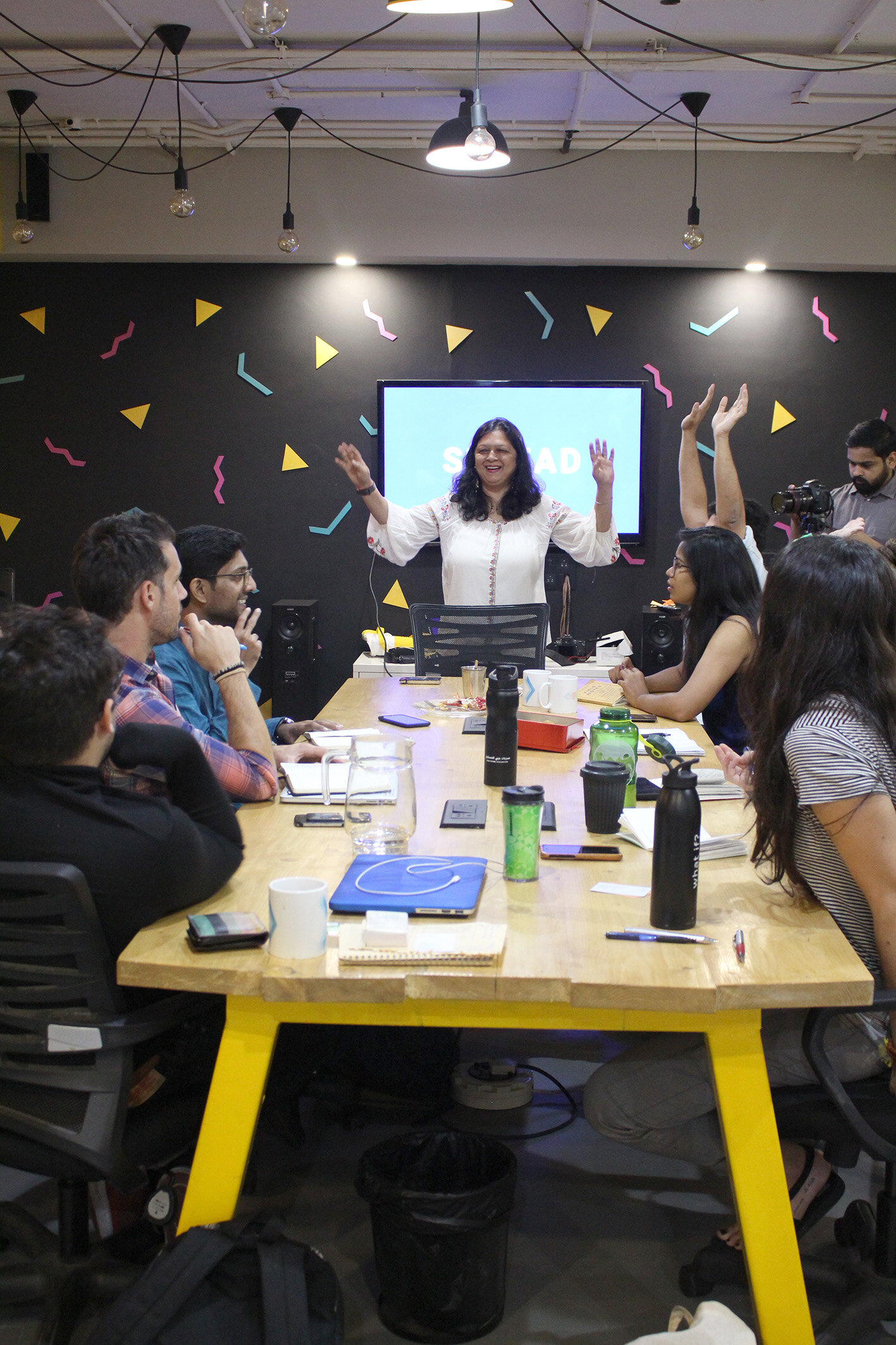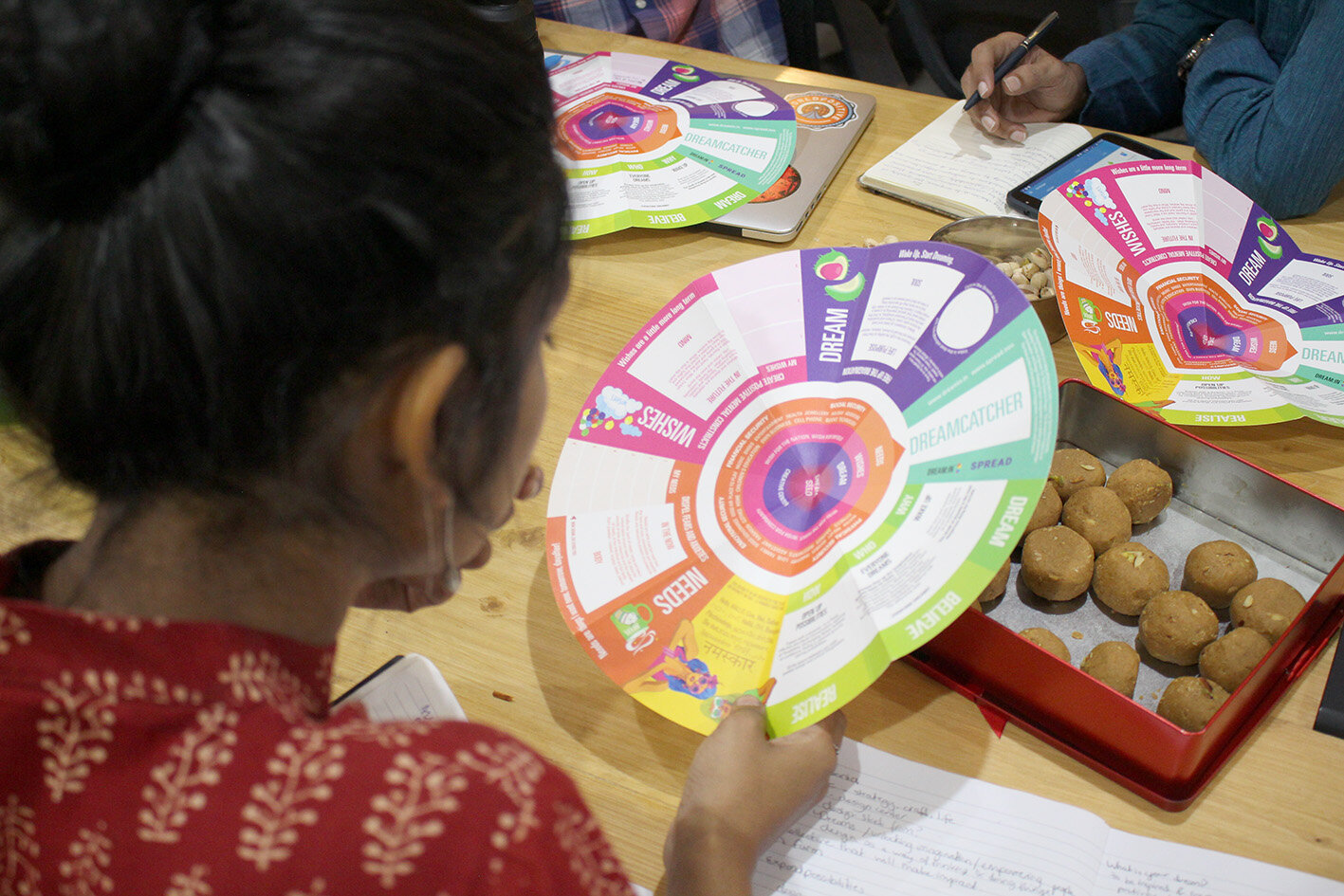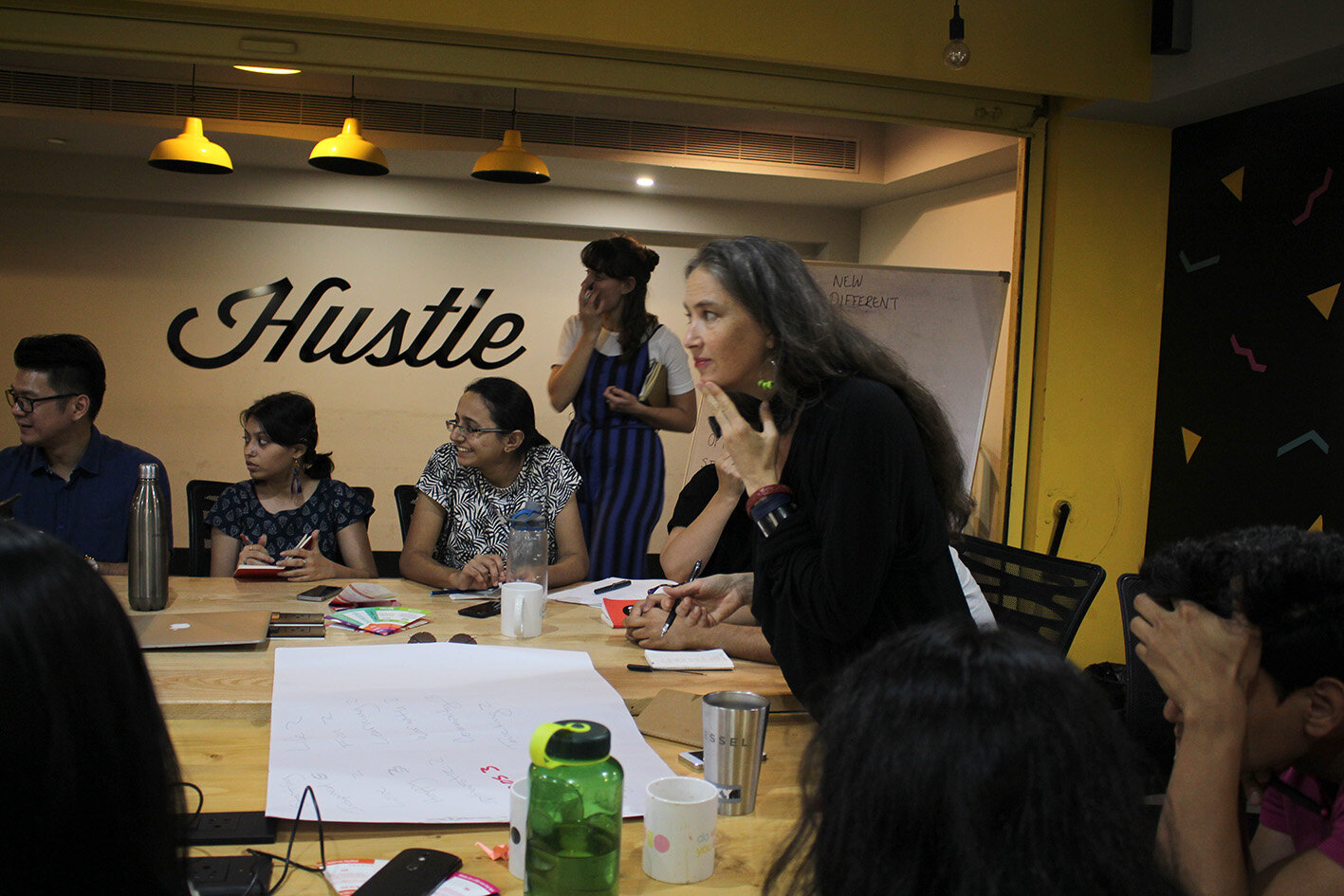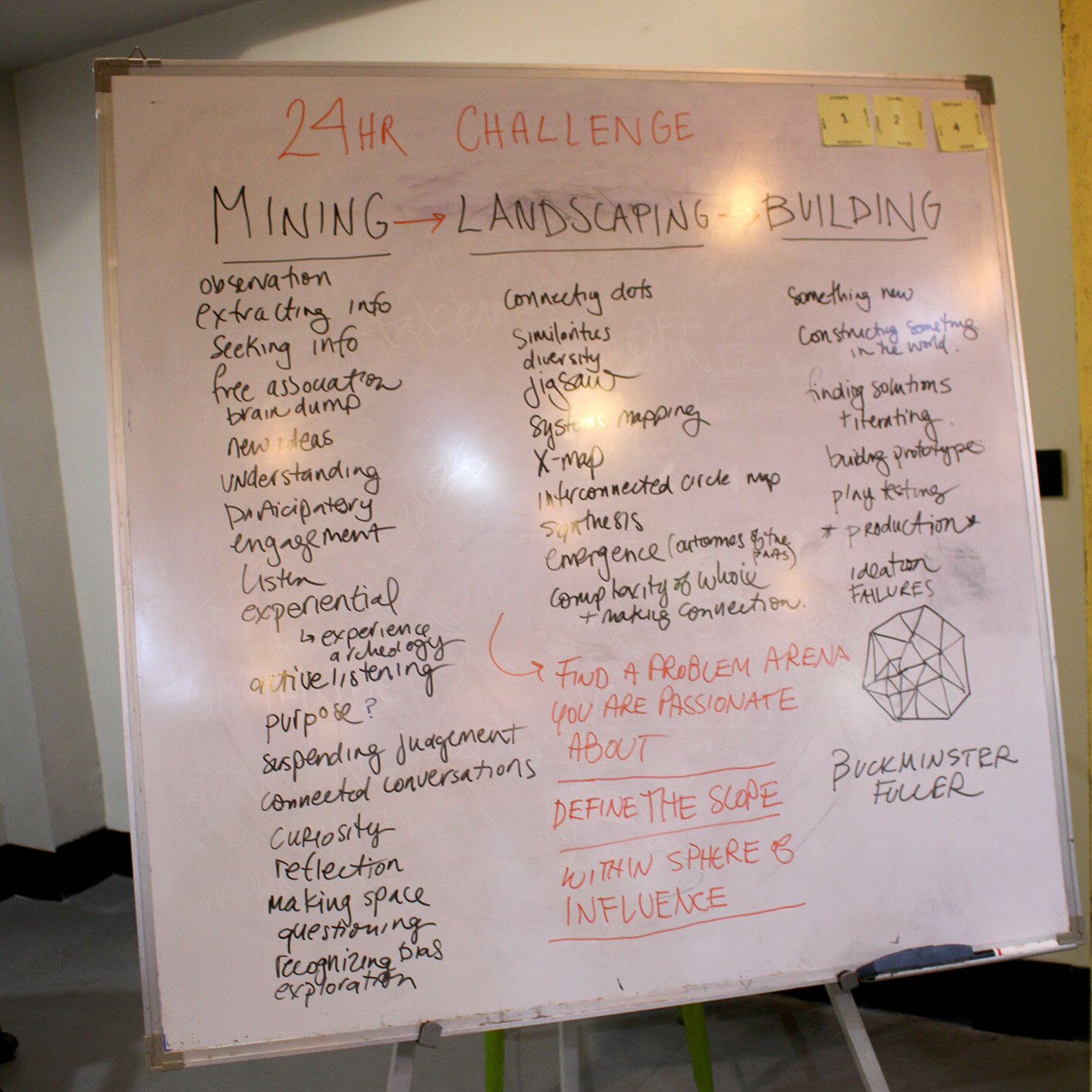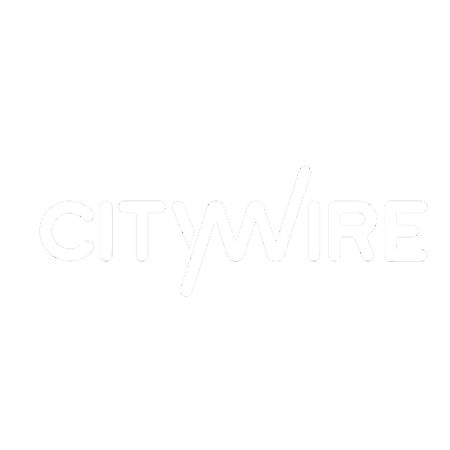Our 9th international emerging leaders fellowship happened in Cape Town, South Africa from May 26 - June 1st, 2018. Watch the video of the incredible week we shared and check out the full day to day break down of what we got up to!
DAY 1 | May 26, 2018
HELLO FROM UNSCHOOL CAPE TOWN!
The 2018 Cape Town Fellowship!
The 9th UnSchool Fellowship has launched, and we’ve hit the ground running! We’re all getting to know each other ultra fast speed with a classic UnSchool one legged stand to learn each others names, and it is all systems go for a filled-to-the-brim week of brain-training, fun and change-making.
Cape Town hosted us with warm weather on Day One, after some cold and wet (but very welcomed!) winter weather experienced earlier in the week. Our local co-hosts, Thessa (UnSchool alumni from Sao Paolo) and Wisaal, put the city into context for us, providing us with historical and cultural insights as well as the practicalities regarding the water situation and how to navigate this situation as visitors to the city. The week is set to be thoughtful and provocative in this beautiful and complex region, stitched together with culturally-rich threads.
The sunshine was accommodating as we made our way to the District Six Museum. The museum was co-created and curated by the memories of those who were forcibly removed from their communities and sent to rebuild their homes and lives on the outskirts of the city. It was established as a two-week exhibition which has turned out to last for 22 years... and counting. Aunty Ruth, a former District Six resident and museum story-teller, shared her history around life in District Six and the immense trauma and challenges that she and thousands of other families experienced living through the system. We were all captivated by her legacy and the legacy of District Six - not forgetting the museum. Aunty Ruth’s jovial spirit and incredible story-telling really moved us as a group and provided great perspective.
Aunty Ruth and the Cape Town fellows sit on the memory map of the once vibrant and diverse community of District Six that was disrupted by apartheid.
Bonita, our guide for the museum, explains all the artifacts we see in this informal museum
The fellows and team brought the excitement along to the home base at The Craft and Design Institute, where we got to know one-another in three minute Pecha Kuchas. Nine 20-second slides to share with the group gave us all a more in-depth understanding of each other. We cheered those who ran out of time and encouraged those who found themselves strapped for words. The consensus was that speaking about yourself against the clock surely comes with its challenges!
The fellows get a rapid fire 20 seconds per slide to tell everyone about their work and life.
After our first session with our lead educator Emma, and a historical walk lead by Wisaal and Thessa, we broke injera (Ethiopian bread) together. The tasty and wholesome dishes paired with some wine, water, or Ethiopian tea provided nourishment. The community meal was a great way to relax after an intense first day, to mingle amongst ourselves with our mouths full and our fingers busy. We know that the week ahead will be bombarded with knowledge, challenges, surprises and the anticipation, but we’re ready! The excitement is palpable as Day Two gets underway.
DAY 2 | May 27, 2018
We got straight into it this morning with the fresh-faced fellows bringing along their artefacts to share with the group over breakfast. The artefacts were precious treasures, trinkets and treats that meant something special or represented something important for each of our fellows; from peanut butter to an indigenous spekboom (bacon tree) plant. Coming together around the breakfast table, we realized just how small the world is and how much we can learn from each other.
There was excitement in the air as we were (virtually) introduced to Dr Leyla Acaroglu, via videoconference. We discussed systems-thinking and change-making before getting into groups to map out some of the social, industrial, and environmental systems that shape our world and our lives. Despite some hesitation, we really outdid ourselves in sticking to the task of creating messy, chaotic and beautiful systems maps in all their complexity. The brain-dump of our collective group’s systems-mapping squeezed out so much juice and the subsequent conversations that flowed really reflected a morning of deep thinking and reflection.
After a refreshing, wholesome, and colourful lunch prepared by the Unschool team (5* star reviews from the fellows!), we hopped onto a Golden Arrow bus also known as “the Bus for Us” which has been servicing the city for 157 years! We left the east precinct and ventured down the highway to meet one of our mentors, Emile YX “vannie Kaap se vlakte” (from the Cape Flats). Emile, who needs no introduction, had a big sense of self, sense of humour, and head of hair! He interestingly started by talking about how he had grown out his hair to its natural state as a part of his search for his identity as a person of colour in Cape Town, South Africa. It turns out that his huge afro matches his unapologetic vibrance and exuberant energy. Since then, Emile constantly found himself going to his creativity and artistry to work his way around the systems that don’t work for him. This has led him to leverage his unconventional teaching methods through hip-hop and dance. He dedicates his life to encouraging and developing youth by equipping them with the personal, practical, (and quite literally physical) tools to navigate social systems in a way that works for them. Emile drew us out of our comfort zones by getting us dancing in a pretty cosy circle – nothing quite like the B-boy’s breakdancing moves though but some fellows were close!
The next adventure had all the fellows curious and guessing where we were off to next. There’s no doubt that the unknown aspect of the Unschool itinerary is part and parcel of the un-learning process! Back on the ‘bus for us’, we headed to a different part of the city, as the sun was starting to set.
All around the world the holy month of Ramadaan is being observed by Muslims. This is a very significant month on the Islamic calendar and is always a special time in Cape Town as the communities are filled with the sharing spirit. Zayaan Khan and her family welcomed us into their family home to boeka (breaking of the fast). As tradition dictates, dates and water were laid out along with savoury treats, fruit, and tea. Zayaan invited us to share our intentions for the UnSchool fellowship with the group, while we rolled date balls. When the clock hit 17:50 it was time to break fast and from then for the entire evening, delicious platters kept arriving from the kitchen. Zayaan shared her story of her identity and how it feeds into the work she does with plants and indigenous food in the Cape. She shared how being aware of those living in the land (and oceans!) can be so replenishing for mind, body, and soul. She also shared a few tips of harvesting plants from her surroundings to make the delicious tea we were enjoying.
The night ended with the fellows talking about what it takes to be a leader and the internal and external conflicts that arise from leading social change – and all of this reflection with very full heads and stomachs!
DAY 3 | May 28, 2018
Day 3 was kicked off with Naadiya Moosaje, who arrived with the tips, tricks, and wisdoms around her journey of social innovation. Any morning sleepiness that lingered in the air was swept away by Naadiya’s amazing storytelling of the trials and tribulations of being a female entrepreneur, in engineering, fashion and the restaurant industry.
She talked about the four types of capital that any entrepreneur needs to successfully start up a mission-driven enterprise, highlighting the importance of community and connection. The fellows had many questions about Naadiya’s experience as an agent of change and were inspired by her honesty and openness. After a quick break, the fellows were invited to address a social innovation challenge which involved picking a local issue from the news’ headlines, breaking down the problem, and then rapid prototyping the solution - all this under 30 minutes! The fellows had to let go of their inhibitions and perfectionism to get ideating, creating, testing! They formed three groups and pitched their 30 minute prototypes on challenging Islamophobia, taxi violence, and linking supporters with resources to those who want to take action. It was great to see what the teams could achieve in just half an hour of messy thoughts, scribbled diagrams, and cut and paste prototypes made out of recycled packaging waste. A great session to get the brain juices flowing for the day and there was still so much more to come...
After another sumptuous spread prepared by the team, we were introduced to self-proclaimed water maverick and shit-stirrer, Bernelle Verster. The Cape Town Day Zero Water Crisis has been an ongoing topic around the world. With Bernelle’s vast experience as bio process engineer, she led us through as session on what the Cape is going through, seeking a deep understanding of the issue around water sensitivity. Many of the international fellows who weren’t as familiar with the practicalities of the drought were surprised to hear about tactics like water restriction devices on water meters that turn the water supply off once the daily allowance is depleted. Bernelle’s proposal is water-sensitive living, or as she calls it, being AquaSavvy.
Unpacking this idea revealed more than just water supply and distribution but also overall water consciousness. After establishing and comparing the options, Bernelle appealed to the fellows to weigh in on her current project and debate the pros and cons of dry toilets vs flush toilets. We used a classic UnSchool game of Verbal Fight Club and embodied various perspectives and roles to work through her idea. She was generous enough to have us give rapid feedback in this fun and interactive debate style, and wrote about her experience at the UnSchool.
Having collectively debated the dry vs flush toilet, the conversation transitioned into a discussion around the bigger issues at play, leading to the need for dry toilets and our ideas around sanitation. Saying goodbye to Bernelle, we then moved downstairs for a reflection session led by Camila, who asked us to reflect on the different ways we’ve been seeing the mentors use unique tactics and tools to navigate complex, challenging systems and make positive and measurable change in the world. With the sun breaking through the welcome rain, we invited the fellows to one last challenge for the day as they were sent off in small groups for dinner. We asked them to try their hand at designing an experience that would help transfer some of the knowledge they’ve learned up to this point to another group of people - peer to peer learning is an accessible and relatable way to engage communities, and we can’t always rely on the bigger system structures in the world. Sometimes you have to dive in there yourself! And with that, we sent them off into the sunset with an early morning ahead for Day 4.
DAY 4 | May 29, 2018
Day 4! Time flies when you’re learning how to unlearn at the Unschool!
Today was nothing short of incredible. After a quick and tasty breakfast, we’re back on ‘the bus for us’! Heading to somewhere unknown in true UnSchool style, we find ourselves in Langa, the oldest township in Cape Town. Not knowing exactly where we are, we take our seats and are introduced to Sihle Tshabalala, the co-founder and CEO of Quirky30.
Hearing his story of how he dedicated his adult life to overcoming the odds of poverty, prison and violence gives us such a deep sense of inspiration that you can actually feel it in the air. You could quite honestly hear a pin drop as Sihle spoke words of wisdom about the importance of turning the negative into the positive, even in the face of adversity. The fellows are stunned by Sihle’s ‘3-D’ ethos of: dream different dreams. He explained how he was able to see marketable skill-sets in the most marginalised groups, for example; gang members and criminals as some of the most innovative entrepreneurs. This is a key component of his talk: finding opportunity where there seems to be only hopelessness. His life story has such resonance with the journey of a social innovator that our fellows can’t stop asking him questions. If only written words were enough to sum up the insights that Sihle shared with the group, but the hugs and gratitude spoke volumes!
Then we picked up the pace and sped right into a rapid prototyping session with the Quirky30 cohort to come up with quickfire solutions to local problems. We formed four big blended groups of Quirky30 and Unschool fellows alike and got talking about a range of issues that were local to Langa such as violence, agriculture, education, and unemployment (issues that affect us all around the world!). We got our heads together to start mapping out the problem arenas of each one issue. With some deep thinking, head scratching, and colourful scribbling, all four groups did a big collective brain dump which laid the foundation for building a prototype solution in 30 minutes - and with lots of conversation to spare! We heard some fantastic presentations of prototypes but it was the process that was the real learning piece here; synthesising the perspectives and experiences of people from all over the world to collaboratively create a seamless solution! It’s not always as easy as it looks and our groups did make it look pretty easy. Judging by the standard of the ideas, there was real genuine interest to make these prototyped ideas an entrepreneurial reality!
With all our brain juice squeezed out, it was certainly the moment for some yummy South African food which turned out to be a big hit! Thank you to Ciki Washington and her Langa-based catering.
Back on the bus again and it’s time to do some quick reflections on our way to the next destination because there’s never a minute to lose at the Unschool. We rocked up in the centre of Cape Town for our next learning-based adventure. Just this morning we were hearing from a digital programmer, youth worker, motivational speaker, community leader, and entrepreneur, all rolled into one amazing mentor, Sihle. Now we were waiting outside an architect’s office door waiting to hear his take on how to unite social justice with innovation. Of course, it turns out that we were extremely privileged to have Mokena Makeka as our second mentor of the day. He talked so effortlessly about his career of building buildings with social change in mind. In fact, he blew our minds with the way he saw various socioeconomic patterns and trends shaping our world. Again, we were full of questions to ask him about his work. After a quick tour of his office space, Mokena showed us some of the most prestigious architectural projects that he had worked on and his thought process behind his creative design decisions - inspiring us to think about the ways we can unapologetically bring our authentic selves into our work! Next stop, we visited Cape Town Station where Mokena took us step by step through his creative process of architecturally designing it. We managed to squeeze in a quick sneak peek of the ‘informal market’ that can be found on the station’s rooftop with the mountains making the perfect backdrop to the hustle and bustle of all the market stalls selling all kinds of everything!
He talked so effortlessly about his career of building buildings with social change in mind. In fact, he blew our minds with the way he saw various socioeconomic patterns and trends shaping our world. Again, we were full of questions to ask him about his work. After a quick tour of his office space, Mokena showed us some of the most prestigious architectural projects that he had worked on and his thought process behind his creative design decisions - inspiring us to think about the ways we can unapologetically bring our authentic selves into our work! Next stop, we visited Cape Town Station where Mokena took us step by step through his creative process of architecturally designing it. We managed to squeeze in a quick sneak peek of the ‘informal market’ that can be found on the station’s rooftop with the mountains making the perfect backdrop to the hustle and bustle of all the market stalls selling all kinds of everything!
Finally we decided to walk to the V&A Waterfront and we were able to do some long overdue sunset sightseeing. At the Waterfront, Mokena our mentor continued giving us a tour of the Cape Town city that he knows and that he has played an active role in designing. It was great to have such open public space to run, play, and take lots of photos - the fellows unschooled all their schooling with childlike play, curiousity, and mischief. Finally, it came to wrapping up the day with a quick reflection on all the ways that we can continue to ‘flip the script’ (in true Unschool spirit) on the challenges, obstacles, and issues currently affecting our lives. This was a great way to end the day by thinking about all the ways that we might turn a weakness into a strength and a threat into an opportunity. Reframing is a really important skill that any social innovator needs to have in order to navigate the long road ahead of change-making.Time for some free time this evening and the fellows decided to go a see more of the city with some food in their belly. A great day full of absolutely mindblowing mentorship and teamwork!
DAY 5 | May 30, 2018
Day 5 quickly jumped into a knowledge-packed day!
As we finished our nourishing breakfast foods, Vuyisa Quabaka, co-founder of Uprise Africa, started his session with a mini networking-style intro by getting everyone in the group to share their professional projects and personal interests. Then Vuyisa continued the networking theme with his tips and tricks for the fellows to leverage their social networks (on and offline!) in an effective and intentional way. We quickly found out why he is one of the top 15 people to follow on social media as he is extremely well connected around the world! Vuyisa gave us the two perspectives on what it is like to be an entrepreneur looking for funding and how it is like to be an angel investor. He shared three different ways to answer the question - how to fund my project? 1) Peer 2 Peer (P2P) 2) Equity Crowdfunding 3) Initial Coin Offering & Bitcoin - which quickly became a hot-topic! The morning ended up with dividing into teams working on what makes an idea investible.
After re-charging with delicious plant-protein Happy Earth People pasta, we kept going with the next big topics: Life Cycle Thinking and Theory of Change. Emma explained the environmental impacts associated with each stage of a product’s life. Clearly deep in thought, the fellows worked through the different stages of products such as a sweater or shoes and we used mapping technique to look at where these products come from, what it takes to produce them, and how they get disposed.
Equipping the fellows for the final challenge, our digital session with Leyla led us all into the Disruptive Design Method (DDM), and cognitive bias. Her high energy and enthusiasm was what everyone needed after a long day of intense brain activating. Learning with Leyla helped us all to tie together the wide range of framing tools and immersive experiences that we shared during the week.
Before the drum roll to present the final challenge, we had space for free writing reflecting on what new insights and new breakthroughs have happened in these intense few days. The fellows had their pens on a roll as they unlearned the impulse to self-censor and instead jot down their thoughts and streams of consciousness, well past the set activity time.
The day did eventually come to an end but the challenge was just getting started as the teams were given their brief for the 24-Hour Design Challenge. Everyone left the room excited and already brainstorming on how to tackle the challenge early tomorrow morning!
DAY 6 & 7 | May 31 & June 1, 2018
The 24-hour Design Challenge has begun! Fellows showed up early for first come first pick on break out session rooms. The challenge now is to time-crunch all the knowledge gained this week, and apply the tools to design a solution to an issue... with the twist of presenting it from the future!
The teams were asked to apply a positive future framing speculative design to their solution. This framework pushed everyone beyond their traditional thought process on delivering a presentation and coming up with an idea. Using the Disruptive Design Method (DDM), the fellows went through an entire journey using systems mapping to find what issues they were collaboratively passionate about and points of intervention.
As the breakout session walls transformed into systems mapping art – teams started to find the problem arenas. One team decided to tackle the fast fashion issue, another team was inspired to look at what makes thriving cities. Two teams, inspired by Sihle (one of our mentors) and his work with Quirky 30, researched on how to flip-the-script on the negative bias usually applied to gangs and prison.
Being at the CBD (central business district) made it easy for the teams to go on field trips being immersed in observational research to check and validate their ideas with the public and also talk with local team members about topics emerging from the rich content in the city. In between snacks were plentiful – we even had pancakes sent from the barakat tradition during Ramadan month! Teams then used the iterative process of DDM to come back with new information and perspectives to apply more systems mapping, landscaping, synthesizing and prototyping to build different solutions for their new insights. They worked late into the night, fueled by a surprise popcorn and ice-cream sundae bar the UnSchool team set up.
Early next morning after some very much needed brain breakfast food (coconut chia banana cinnamon pudding for everyone!), the teams wrapped up the final details for their solutions in preparation for practice pitches with the UnSchool team and Leyla via the internet! During the one-and-one team presentations, Leyla shared her tips and tricks on how to engage and create evocative and thoughtful presentations. With some twists and positive constructive feedback, the teams had time to make some quick changes while working against the clock before their final presentations.
At the final Design Challenge hour, the fellows participated in a community review process. Everyone rotated to review the presentations based on Viability, Change Potential, and Community to represent a different lens to each idea.
The intense seventh day week ended with popping champagne bottles, sparkling water and flowers for our fellows who were fasting. Each team did an incredible job and were very creative in presentations format. The scores were so close, but rounding to the tenth left one final winner! The creative and engaging presentations involving hug exchanges, transporting fellows to New York, and achieved the purpose of creative positive future framing.
After feasting on beautiful and colorful lunch and singing happy birthday to Andy, one of our local team members, we transitioned into a final memory-recalling and reflective session on our insights, wishes and tools to take away. The entire group then ended with a final reflection circle to share final thoughts on the week. The circle wrapped up with one of the fellows leading a call and response Kausar chant of ‘amandla’ (power) and the group responding ‘awethu’ (within) - a reminder that the power is within us. With filled hearts and brains, we said our temporary good-byes... the fellows were already planning an after party to celebrate that we are all now part of the the UnSchool Alumni family!
See you at the next UnSchool Change Makers Fellowship!
